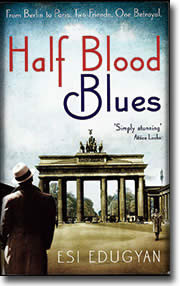 Reading the Longlist:
Reading the Longlist:
Cross-stitched Jazz and War
Half Blood Blues
by Esi Edugyan
Review by Patrick McGinty
All Americans confront jazz and war at some point. In the fourth grade, while practicing our Postal Service-slow rendition of the jazz classic “In the Mood,” our band director said it was our duty as Americans to play it well. A year later I dared a classmate to eat five egg rolls on a school trip to Gettysburg, prompting a good splash of vomit and the strangest anthropomorphic scolding of my childhood: “Gettysburg doesn’t have time for fun and games, Patrick.” Which is to say: tread lightly around Super Symbolic American Stuff.
Perhaps because she is Canadian but more likely because she is an alarmingly talented writer, Esi Edugyan treads however she wants over familiar fictional grounds in her second novel, Half Blood Blues (Serpent’s Tail, 2011). The novel is set against Europe of the war-torn '40s and Wall-falling early '90s, but this is not a “topical” nor “historical” novel any more than it is a book explicitly about jazz and war. Half Blood Blues is a novel-long confession driven by a unique and effective dialect, one that launches each psychological salvo in alternating registers.
Edugyan’s instrument is Sidney Griffiths, a bass-playing narrator who relays his story in a “half-German, half-Baltimore bar slang.” The novel starts simply: the Hot Time Swingers are a popular jazz group of black musicians hiding out in Nazi-occupied Paris. Their trumpet player, Hiero, “stupid young for what all he could do on a horn,” ventures to a cafe in search of milk for his coffee. Sidney tags along, and when the “Boots” pick up Hiero for lacking papers, Sid watches as the rising jazz star is dragged off to a work camp.
The story springs both forward and backward from this pivotal, introductory note. Sid spends the summarized decades as a medical transcriptionist for several doctors, typing the “long, complex illnesses of their patients [and] thanking god it wasn’t me.” But Sid has an illness with its own complexities: guilt. When his former bandmate Chip discovers Hiero is alive in Poland, the foreground of the novel becomes their trip to reunite with him. As is customary with musicians, betrayals litter both the past and evolving present. Accusations in a documentary, a shared woman, mishandled visas, and controversy over a now famous recording all suggest that Sid’s guilt started long before the night Hiero went for milk.
That a simple story about a milk run evolves into this wonderful novel is a testament to Edugyan’s care for her prose. Sid continually lays down a Strunk & White beat (“the thick shag carpet of my narrow living room drowned in clothes and folders and trash, the detritus of a life”) then shifts into flow Kanye could poach (“See, we was set to fly out the next day”). Edugyan has cross-stitched jazz and war into every line, changing registers from proper English and German to tense-optional slang, presenting both Sid’s self-assured voice and the darker corners of his memory. The character is at war with himself and the dialect, rightfully so, follows suit. Complaints about dialectical inconsistency are misguided.
Such misinterpretations might come from readers seeking cannon-fire and Big Band rehearsals. These pomp and circumstantial scenes appear, but the most lasting contribution is in the small workings of the prose, crafted by a Canadian writer of Ghanaian descent following Afro-German and -American characters across Europe. Historical fiction often grave-robs personalities and plots from the Super Symbolic American Stuff, but aside from a stiff Louis Armstrong appearance, Edugyan is as wise as she is imaginative. She starts with a small crack and allows it to grow weedy. Hiero goes for milk, Sid follows. Edugyan does too, and her prose is game. And if I had to bet, she can probably eat five—no, six egg rolls, too. Ω
Patrick McGinty's fiction is forthcoming in ZYZZYVA and The Portland Review.


